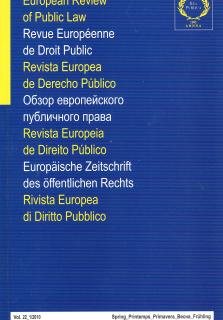
“Le droit tout puissant et unique de la société”:
Paradoxes of Administrative Law
Sabino Cassese
There are many contradictions in administrative law, which characterize both its history and its present: The tumultuous and fast evolution, the development around three separate poles, the difficult and not always clear relations with constitutional and civil law, the different research interests of the national legal schools. A “young” law, whose birth, dating back to the 19th-century France, a rapid growth has followed, inspired by the different forms of authoritarianism, liberalism and socialism. These schools of thought, which came one after the other at different times, are today living in administrative law and are reflected in its “tripolarism” and its continuous oscillations. The uncertain position in the legal order makes even more difficult the analysis of this field of law, whose relations with constitutional and civil laws reflect a continuous game of overlap and “gains”. Within such a heterogeneous framework, it is not surprising that also the ways the scholars understand administrative law are different. The interests of the Anglo-Saxon schools differ, for example, from the ones of the French school and from the more advanced administrative cultures, highlighting different perceptions, prejudices, practical needs. To the past tensions are added those of the present. The dialectic between policy and administration, between the public and private sectors, between statal and universal, between national and transnational is at the base of the largest problems of administrative law today. Despite the fact that the principle of legality is the basis of the administrative action, there are parts of the administration that are beyond the law and the control of the judges. In these “empty” spaces political choices sneak, whose interference is hardly hampered by the tools of the Rule of Law, the rules of “good administration”, the types of “justice in the administration”. The administrative action is also captured by a “pendulum” motion, which originates in the process of expansion of the public sector (above all through programs of State interventionism and “collectivism”), turns into the opposite trend of reducing (through privatization, deregulation, outsourcing), returns to the re-expansion, suggested by the numerous interventions of the public sector in response to the recent financial crisis. Finally, administrative law exceeds the boundaries of the State, applying between the States and beyond them. This process tends to “universality” (“law of mankind”), but it runs into the characters of “transnationality”, or, in other words, into the different nature of ultra-State legal orders. The regulatory schemes of administrative law transplanted in these new contexts, show, in fact, a common root (that allows their transnational application), but at the same time, take different forms (result of their practical implementation in the ultra-State systems). With respect to such panorama, the legal administrative science is focused only on the “short term”, neglecting that the integration with the other disciplines offers a better method of study, and that it is in the long term that the reasons of the paradoxes of administrative law can be seen.





















